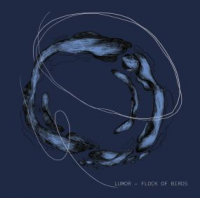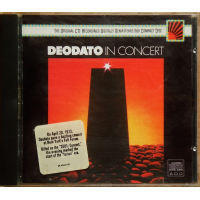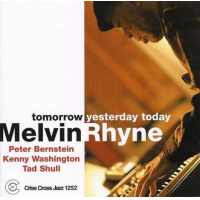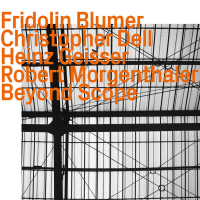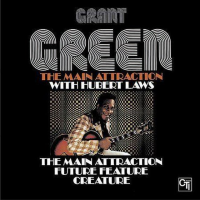Home » Jazz Articles » Liner Notes » Hal Galper Quintet: Live at the Berlin Philharmonic 1977
Hal Galper Quintet: Live at the Berlin Philharmonic 1977
He has since stopped touring, and with the release of the 2018 quartet outing, Cubist (Origin, 2017), had come to the realization that he had accomplished virtually everything he had set out to do in music.
"I realized at that point, I had achieved every goal I had set for myself, it was a shock. I was really happy with the way Cubist came out. I got to the point after that album that now I was to the point Bill Evans talked about, which is being in competition with yourself," he recalls.
While sifting through his archives in 2019, Galper heard a remarkably solid board recording of a 2016 trio gig he played at the Yardbird Suite club in Edmonton, Alberta. He found the playing remarkably cohesive, not realizing it was indeed, himself. The result was The Zone (Origin, 2019), a recording which may very well represent the best of Galper's trio efforts.
"I didn't recognize it, because none of us played anything that we had played before. It was all totally in the zone," he says.
Galper began to work with John Bishop on other ideas for legacy releases on Origin Records. He first settled on a quintet performance recorded in 1977 at the Berlin Philharmonic, featuring trumpeter Randy Brecker, and his now iconic younger brother, the late, great tenor saxophonist, Michael Brecker. The result, Live at the Berlin Philharmonic 1977 (Origin, 2021), highlights a decade of diversity and change for the pianist, and a superb assemblage of musicians that served as a vehicle to steer Galper's playing in new directions.
Jazz was experiencing an identity crisis of sorts in the 1970's. With the proliferation of progressive rock, jazz was becoming less popular, and its artists became more open to experimentation with electric instruments. Galper entered the fray leading a band on electric piano that included both Brecker Brothers. The lineup produced two studio sessions—The Guerilla Band (Mainstream, 1971), and Wildbird (Mainstream, 1972).
Galper would then take over the piano chair in the Cannonball Adderley Quintet from George Duke, and spend three years on the road playing mostly electric piano with the iconic alto saxophonist. During that time, he led several studio sessions on acoustic piano as well, including an introspective trio date with Dave Holland and Bill Goodwin titled Inner Journey (Mainstream, 1973), and a brilliant read and react duo session with alto saxophonist Lee Konitz named appropriately, Windows (Steeplechase, 1976).
The formation of the quintet heard on this recording served as a reunion of sorts for Galper and the Brecker brothers, while adding bassist Wayne Dockery, and drummer Bob Moses. It served as a trailblazing period for Galper as well, a touchstone event in his career as a bandleader. In the studio, Reach Out (Steeplechase, 1977), put Galper at the helm of a quintet with the skill set to hang with him as he hit his collective stride as a pianist, bandleader and composer. Speak With a Single Voice (Century, 1979) captured the quintet live. The band performed with tremendous energy, pushed to the limits by Galper's astonishing facility, full-bodied sound, and fertile imagination.
"That has been my focus, to maximize my growth every minute I'm playing. I'm going to push the envelope. I'm not going to sit back," he points out.
Still, Galper heard something in the Berlin recording recently that he felt better represented the quintet's sound during that period, in a no holds barred sort of way.
"We had one live performance recorded, which was Speak With a Single Voice. But that was tightly controlled -nobody has really heard the band like it was recorded here. Free-wheeling, faulty, chance taking, devil-may-care, spaced out, manic. I'm a warts and all kind of guy, I'd rather live with my mistakes, because the spirit of the music is always just in the first take. I'm not doing it to be perfect, I'm doing it for fun. It's the process, not the end result I care about. This shows the band extended," says Galper.
This recording captures a moment in time when Galper formed the perfect band to play the way he envisioned, to push the envelope as far as the band possibly could. The recording will add yet another remarkable achievement in the career of the visionary pianist, and introduce his music to new generations of jazz fans. The record should as well engage the immense following that Michael Brecker has acquired in the saxophone world, between this performance, and his tragic death in 2007. The solo work here by both he, and brother Randy on trumpet and flugelhorn, is superb, supported ardently by Galper and his partners in the rhythm section.
Throughout this performance, the band seems to have shifted into overdrive, with Galper's powerful style, both comping and soloing, acting as the nitro that ignites this eclectic gathering of musicians. Beginning with the opening salvo of Galper's "Now Here This," the intuitive communication between the congregants is clearly evident. Drummer Moses plays in and out of the groove laid down by bassist Dockery, bearing the marks of time spent in the boundary pushing ensembles of Rashaan Roland Kirk, Gary Burton and Larry Coryell. Galper steps out for the majority of Michael Brecker's scorching tenor solo, then returns to the fray, comping in between Dockery's grounded bass line, and Moses' polyrhythms.
Galper's piano intro on "I'll Never Stop Loving You" has reminiscent marks of Ahmad Jamal's 1960 recording of the same. The ballad was recorded as part of a Michael Brecker Quartet set, two months after the Galper date on the same stage in Berlin, providing a collective deep breath within the set. Brecker's soaring interpretation takes the melody into the clouds, and back down to earth in a sonic manner. Galper's voicings on his elegant solo spool out freely, making time seemingly stand still, beholden to the beauty of the moment. The tune climaxes dynamically by an astounding saxophone cadenza by Brecker.
While other pianists of his generation have attained iconic status both in name and accomplishment, Galper's name seems to often slip under the radar of legend. Time has a way of balancing things out, of turning legend into history. Galper's contributions as a leader of boundary pushing bands, and as a sideman for masters of the form, are well established. His innovations in time, and the subsequent rubato revolution with his trio, serve as a major contribution to the music itself. With Live at the Berlin Philharmonic 1977, we are given a snapshot in time of one the the most innovative acoustic jazz bands of the 1970's, playing at their absolute best in front of an enthusiastic audience. Through the lens of time, its power and beauty comes to life with new perspective.
Liner Notes copyright © 2026 Paul Rauch.
Live at the Berlin Philharmonic, 1977 can be purchased here.
Contact Paul Rauch at All About Jazz.
I am a writer, producer and coordinator in the jazz community, living in Seattle.
Track Listing
Now Hear This; Speak with a Single Voice; I’ll Never Stop Loving You; Triple Play; This Is the Thing; Hey Fool.
Personnel
Hal Galper
pianoMichael Brecker
saxophone, tenorRandy Brecker
trumpetWayne Dockery
bassBob Moses
drumsAlbum information
Title: Live at the Berlin Philharmonic, 1977 | Year Released: 2021 | Record Label: Origin Records
Tags
PREVIOUS / NEXT
Support All About Jazz
 All About Jazz has been a pillar of jazz since 1995, championing it as an art form and, more importantly, supporting the musicians who make it. Our enduring commitment has made "AAJ" one of the most culturally important websites of its kind, read by hundreds of thousands of fans, musicians and industry figures every month.
All About Jazz has been a pillar of jazz since 1995, championing it as an art form and, more importantly, supporting the musicians who make it. Our enduring commitment has made "AAJ" one of the most culturally important websites of its kind, read by hundreds of thousands of fans, musicians and industry figures every month.








